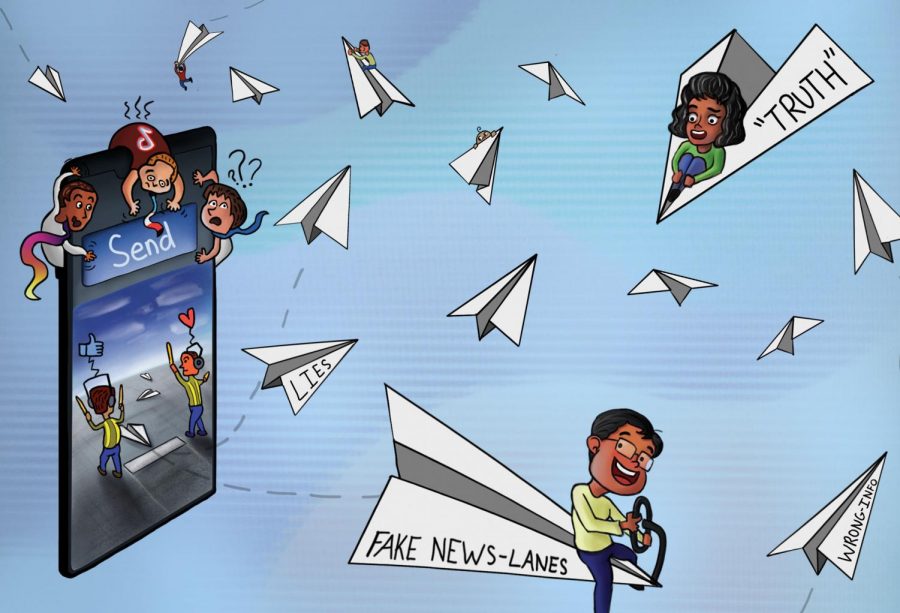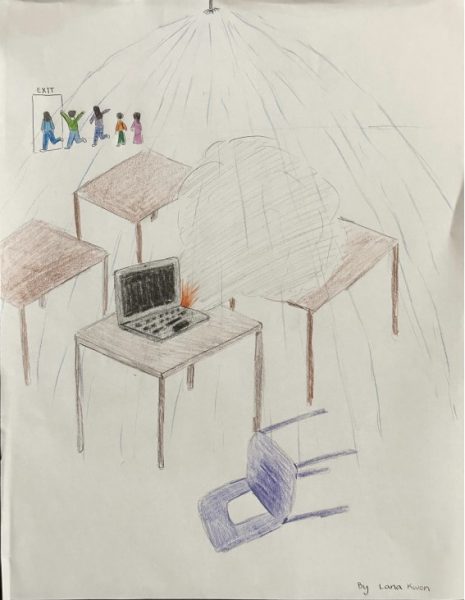Big Tech
Internet users are accountable for what they say online but they should not be regulated more online than in real life
People on social media often share misinformation with little worry over the consequence of their own voice.
Social media is probably one of – if not – the fastest way information is spread. With that comes a lot of responsibility and the debate on just how much control these companies should have arises. Students at Woodbridge have probably been on the internet and encountered misinformation on social media sites, which shows how much this problem affects the student body. Social media companies should monitor and warn the public of misinformation on their sites but should not completely censor it unless it can cause direct harm to any person or group of people.
Facebook is one of the most notable social media sites accused of allowing the spread of misinformation. This conflict reached as far as congress when in 2019 Mark Zuckerburg, the CEO of the company, was questioned on the content his company allows to be posted on their site. At this hearing, Congresswomen Alexandria Ocasio-Cortez questioned Zuckerburg on Facebook’s refusal to fact check their political information and in response Zuckerburg stated that censorship happens only “when there is imminent risk of harm”. That is to say that unless there are immediate threats being made on the site, misinformation is not controlled or stopped by the company. The problem with this is that even though direct threats aren’t made through a spread of misinformation, these false narratives can be very harmful and should not be taken lightly.
The riots at the capitol is an example of how much of an impact the things said on social media have. This mass insurrection against the government of the United States that was in large part planned on the internet and yet social media companies were not able to prevent it. It seems clear that in these situations the things spread are much more than just misinformation and should be treated as such. Hate speech or any type of organization to do harm to a person or group of people should be censored and stopped and should not be categorized as just “misguided speech” because the ramifications of it are more severe and damaging. In these cases, social media companies should do more to hold their users accountable by reporting them to organizations which would deal with how to prevent any potential threats to public safety.
However, some may say that misinformation is present in real life and conversations online should not be held to a different standard. People in real life and through a screen have a responsibility to what they say so whether or not they choose to knowingly spread false information is up to them. Posting something online that isn’t factual but also isn’t harmful only affects the reputation of the user who posts it and so it is a users responsibility to decide what information they want to put out. This isn’t to say that this misinformation should go completely ignored. Companies have systems in place which allow them to warn the public users on their sites of potential misinformation, such as Twitter and Instagram’s ability to flag false content, where it remains on the site with a warning. This way of dealing with the spread of false information makes a lot of sense as it gives warning to whoever may come across any false information without taking away anyone’s right to voice their thoughts on public forums.
Students at Woodbridge see social media and tech companies as an omnipresent issue in our daily lives.
“I believe it’s the job of social media companies to prevent the spread of wrong information … it can lead to bigger events that could harm small or larger groups of people,” junior Golsa Rahbari said.
Contrastingly, senior John Soss voices an opposing opinion on how spread of information on the internet should be dealt with. “I think that people should be held accountable for disgusting views they hold but no legal action should be taken online, people should be held as accountable as they are in real life and groups of people should have a right to dislike what someone says,” Soss said.
People on the internet have a right to say what they want but cannot be guaranteed a positive response. Cancel culture is a relatively recent pop culture phenomenon in which a group of people call out others with large platforms on social media for things they deem incorrect. The goal of “canceling” someone is to take away their platform in order to punish whatever behavior they were cancelled for.This has nothing to do with censorship and everything to do with how the public receives the actions of public figures. Cancel culture in some situations can lead to toxicity but there is nothing wrong with influencers and celebrities alike receiving criticism for their actions because it was their choice to put themselves in the public eye; with that comes judgement from the public on most things they do.
Social media is no different than any other form of self-exposure. The information we post online stays with us forever and so it is important to be mindful when posting because every action has an effect. Misinformation online could potentially result in violence. Be mindful of media you consume while understanding that not everything posted online is reliable. Ultimately, censorship on social media should be done through warnings of misinformation rather than complete deletion of posts and should follow similar rules for public speech as in real life.
Your donation will support the student journalists of Woodbridge High School. Your contribution will allow us to purchase equipment and cover our annual website hosting costs.

Hey, Woodbridge students! This is my first year working at the Golden Arrow and I'm excited to be able to represent various sides of Woodbridge High life...

Hello Warriors! My name is Daniel Roman and I am an illustrator who loves the idea of sharing my creative passion with everyone through the Golden Arrow....







